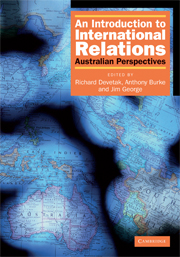Book contents
- Frontmatter
- Contents
- List of tables, figures and boxes
- List of contributors
- Preface and acknowledgments
- An introduction to international relations: the origins and changing agendas of a discipline
- 1 Theory and practice in Australian international relations: the search for identity and security
- Part 1 Theories of international relations
- Part 2 The traditional agenda: states, war and law
- 10 The modern state and its origins
- 11 Nationalism and war
- 12 Security
- 13 Arms control
- 14 The changing character of warfare
- 15 The ethics and laws of war
- 16 International law
- 17 International society and european expansion
- 18 Order and decolonisation in Southeast Asia
- 19 The cold war
- Part 3 The new agenda: globalisation and global governance
- Glossary of terms
- Bibliography
- Index
- References
11 - Nationalism and war
from Part 2 - The traditional agenda: states, war and law
- Frontmatter
- Contents
- List of tables, figures and boxes
- List of contributors
- Preface and acknowledgments
- An introduction to international relations: the origins and changing agendas of a discipline
- 1 Theory and practice in Australian international relations: the search for identity and security
- Part 1 Theories of international relations
- Part 2 The traditional agenda: states, war and law
- 10 The modern state and its origins
- 11 Nationalism and war
- 12 Security
- 13 Arms control
- 14 The changing character of warfare
- 15 The ethics and laws of war
- 16 International law
- 17 International society and european expansion
- 18 Order and decolonisation in Southeast Asia
- 19 The cold war
- Part 3 The new agenda: globalisation and global governance
- Glossary of terms
- Bibliography
- Index
- References
Summary
Introduction
This chapter examines two debates that have divided scholars on the meaning and significance of nationalism as a force that has profoundly shaped modern international society. The first debate concerns the terminological confusion surrounding the composition of national identity and whether nations and nationalism should be regarded as pre-modern or distinctively modern phenomena. The second examines the paradox of why nationalism has been characterised as both a progressive force that helped to build international society and a destructive force that causes war. From the perspective of the study of international relations in an Australian context, these debates continue to have significant practical implications for understanding some of the most challenging practical problems confronting contemporary global politics.
What is a nation?
The terms nation, nationality and nationalism are all notoriously difficult to define. Scholars disagree on whether the most important characteristic of nations should be its physical, spiritual or social characteristics, whether it is old or new, whether it is imagined or real, whether it is separate from the state or not and so forth (see Box 11.1). As political ideologies, nationalisms have been characterised as democratic or authoritarian, imperial or anti-imperial, forward looking or backward looking, state-led or state-seeking and pre-modern or postmodern. In fact, the only thing that scholars on nations and nationalism seem to agree upon is that the concepts are ‘impossibly fuzzy’ (Kamenka 1975: 3) and that attempts to arrive at a coherent universal definition of these words are at best ‘foolish’ or at worst, ‘a bootless exercise of definitional imperialism’ (Nash 1989: 125; also see Comaroff and Stern 1997; Connor 1994; Seton-Watson 1977).
- Type
- Chapter
- Information
- An Introduction to International RelationsAustralian Perspectives, pp. 133 - 143Publisher: Cambridge University PressPrint publication year: 2007



